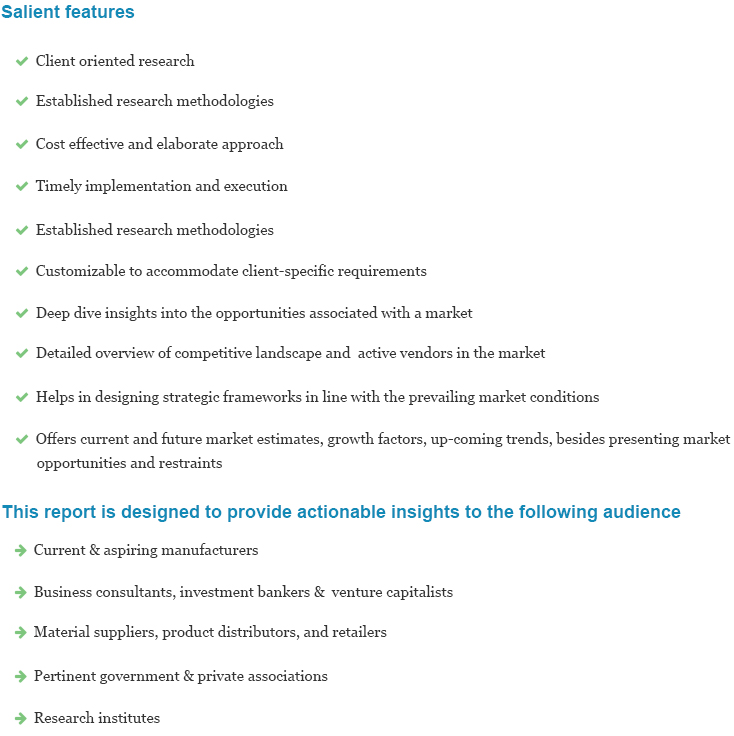
Digital Health Market Size, Growth, Trends, Share, Application Analysis, Competitive Strategies, Research, And Forecasts Report, 2015 To 2025
- Published: January, 2019
- Format: Electronic (PDF)
- Number of pages: 70
- Industry: Healthcare
The global digital health market is anticipated to witness significant growth in coming years owing to rising demand for remote patient monitoring. Digital health is the combination of digital technologies with health care and society. It allows an individual to track and monitor medical condition even in remote areas. It also helps reduce inefficiencies, and costs of medical care sector and improves access to medical services. In addition, it is concerned about development of interconnected systems for efficient use of smart devices and computational technologies. This further helps patients and medical care professionals to manage illness and medical risks.
Increasing use of smart phones, tablets, and other mobile applications by medical care professionals to access and monitor medical information of patients can propel market growth. In addition, growing adoption of various medical care information technology (IT) solutions to provide advanced medical services to patients can augment market growth. Such medical care solutions include e-prescribing, electronic medical records, remote patient monitoring, and wearable medical devices. Rising demand for remote monitoring services owing to increasing cases of chronic diseases can also impel market expansion in coming years. Increasing investments by private institutions and rise of corporate venture capital for the development of medical care IT sector can further stimulate market growth.
However, growing data security concerns related to patient’s personal information can hamper market growth. Rising cases of cyber security threats to gain access to information technology (IT) systems can restrict growth of market in coming years.
The market can be segregated on the basis of technology, telemedicine, and end-user. Key technologies associated with the market include health, connected devices, and services. On the basis of telemedicine, the market can be classified into tele-monitoring, teleconsulting, tele-training, and tele-education.
North America is the leading region in the market owing to better medical care infrastructure. Rising adoption of advanced technologies, such as radiology information system (RIS) and electronic health record (EHR), in hospitals can reduce timeline for medical documentation. Implementation of HIPAA act and HITECH act to promote use of EHR services can boost regional market growth in coming years. Health information technology for economic and clinical health act (HITECH act) is expected to motivate implementation of EHR and supporting technologies in the United States. Medical insurance portability and accountability act (HIPAA act) is related to announcement of standards for electronic exchange, security, and privacy of patient’s personal information. In addition, existing market players are acquiring local firms in order to expand their market share, which can further impel regional market growth in coming years. For instance, Allscripts Healthcare Solutions Inc. acquired HealthGrid Holding Company to incorporate HealthGrid’s competencies to its FollowMyHealth platform.
Asia Pacific is likely to emerge as one of the promising regions in the market owing to rising cases of chronic diseases among geriatric population. Increasing use of smart phones, improving medical care infrastructure, and supportive government initiatives are likely to fuel growth of market in coming years. Implementation of telemedicine projects in countries, such as India, China, and Japan, can also impel market expansion in the region. For instance, the state health and family welfare department in Visakhapatnam joined hands with Apollo hospitals to provide free tele-medicine services to rural and urban population. The project includes upgradation of 164 urban primary health centers (UPHC) to E-UPHCs. In addition, government of India introduced a new project called DigiGaon or Digital Village. The project attempts to connect villages with Wi-Fi facility to provide digital education to residents. The initiative will allow residents to access quality services, such as telemedicine, skills, and education, through the use of digital technologies.
Europe is likely to emerge highly lucrative in coming years owing to supportive initiatives by European Union (EU) to promote digital medical care in the region. For instance, EU-funded initiative eHealth Hub launched eHealth Hub platform. It’s a free online catalogue that maps the ecosystem of information technology (IT) companies, corporate supporters, and investor experts. The aim of the initiative is to enhance transparency in the sector and allow stakeholders to promote their business. In addition, creation of a new Digital Europe programmme is likely to support digital transformation of health care in the region. EU’s legislative framework is based on innovative technologies to allow cross border access of data and creation of accurate, personalized, and patient oriented health care.
Some of the leading companies operating in the digital health market are McKesson Corporation, Qualcomm, General Electric Company, Symantec Corporation, and Cerner Corporation.

Choose License Type
- World's largest premium report database
- Transparent pre & post sale customer engagement model
- Unparalleled flexibility in terms of rendering services
- Safe & secure web experience
- 24*5 Research support service
